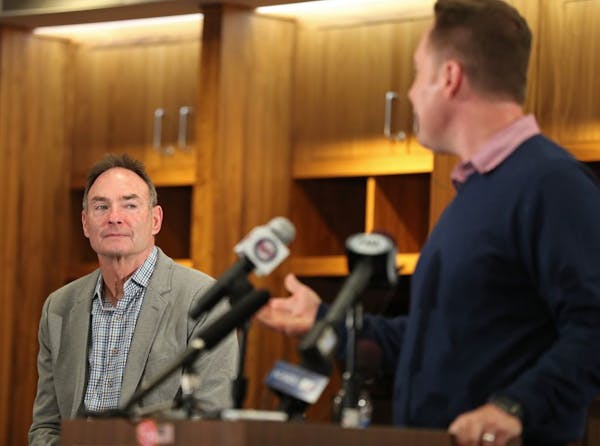There was a new emphasis on modern statistics and graphs when Derek Falvey, then 33, took full charge of the Twins baseball operation last November. Paul Molitor, then 60, was guaranteed to remain as manager for 2017, and he was willing to look at all the charts provided by the Falvey administration.
Amid the analytics, it was an old-fashioned statistic Molitor noted that caused him to look at fielding as perhaps the most-vital area of improvement required for the Twins to rebound from the 59-103 disaster of 2016.
"I was looking at the American League team fielding,'' Molitor said. "And the difference in errors was eye-opening. There was less of a difference in total errors between the first and 14th teams in errors, than between the 14th and 15th teams.''
Yes?
"We were 15th,'' he said. "I know it's errors, and those are surface numbers, but having a greater gap between us and the 14th team than the 14th team had with the No. 1 fielding team … that couldn't be good.''
Molitor laughed at the absurdity of that 2016 fielding performance, as he was permitted to do on Tuesday – one day after the Twins' turnaround in 2017 earned him a three-year contract extension from Falvey and owner Jim Pohlad.
Here were the numbers in 2016: Detroit had the fewest errors with 75 and Texas was 14th with 97 errors. The Twins were 15th with 126 errors. There it was: 22 errors difference between first and 14th, 29 errors difference between 14th and the Twins.
"Uff da,'' I said to Molitor.
"Definitely,'' Molitor said. "Our pitching was terrible, too …. last in the league by a big margin, but if we didn't start catching the ball, it was going to be that much more difficult for the pitching to improve.''
The 2016 Twins gave up the most earned runs in the league, 814 for a 5.08 ERA, and also the most unearned runs at 75. The 2017 Twins were ninth in the American League with a 4.59 ERA, and half the league allowed more unearned runs than the Twins' 56.
The Twins had the second fewest errors in the league, 78, which was two more than Cleveland, and 48 fewer than in 2016.
"It was more than catching the ball,'' Molitor said. "We weren't perfect – Eddie [Rosario] threw it to the wrong base a few too many times, for instance -- but most nights, we made the right plays.''
Improved fielding was a certainty coming out of spring training, as long as Byron Buxton was in center field. Flanking him with Rosario and Max Kepler gave this franchise its most-athletic outfield … ever.
OK, Puck, Gladden and Brunansky was very good, as was Puck, Gladden and Mack, but Buxton is a different presence in the outfield even than Kirby Puckett, even than Torii Hunter.
The big question in Fort Myers in March was the left side of the infield. Miguel Sano turned out to be adequate at third before getting hurt. Eduardo Escobar was exceptional there, once Sano was hurt.
The major surprise was Jorge Polanco at shortstop. "He was better than we thought he was going to be,'' Molitor said. "I give [coach] Gene Glynn a lot of the credit for getting the best out of Jorge.''
The Twins' previous baseball operation had made the decision that Polanco was not a shortstop. He was in Class AAA Rochester for much of last summer, playing second base, never starting a game at shortstop.
Once he joined the awful Twins of last season, Molitor put Polanco at shortstop … more out of desperation than a belief he could be an every-day player at baseball's second-toughest position (behind catcher).
The Twins decided to go with Polanco at shortstop to start spring training. Some of the old problems still existed – getting rid of the ball, then responding by booting the ball while being too anxious to make a play.
"He was trying to do everything perfect, everything he had been told, to prove he was a big-league shortstop,'' Molitor said. "Gene told him, 'Do what you do. Clear your head and make the plays the way you've made 'em your whole life.'
"Jorge did that. There was a week or two, when he wasn't hitting that he seemed anxious, but for the most part, he did a good job for us. That was as important as anything.
"You're not going to play much better in the field without a capable shortstop. We're all proud of what Jorge did this season.''
One of those being, he helped his manager get a new three-year contract.
Chasing 5th straight win, Nelly Korda is 2 shots back at Chevron Championship after a first-round 68
The Timberwolves coaching staff, empowered by Finch and energized by chemistry, is a true asset

Trail section at one of Minnesota's most iconic spots closing for rehab

Will 'shotgun only' zone for deer in southern Minnesota be abolished?

